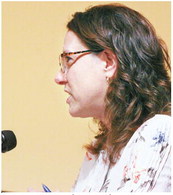Tax rates tumble


Rising property values resulted in a lower than previously projected tax rate for the Medford school district.
However as many district residents saw their property assessments climb the bottom line impact on individual taxpayers’ pocketbooks remains to be seen.
At Monday’s school board meeting, board members formally approved the 2023-2024 school budget with $39 million in overall spending across all budget areas and set the tax rate at $5.87 per $1,000 of equalized value. By comparison, last year’s school tax rate was $5.42 per $1,000 of equalized value.
At the annual meeting held in August, district residents had approved a preliminary tax rate of $7.09 per $1,000 of equalized value.
See MEDFORD on page 3 District finance director Audra Brooks explained that since the annual meeting, the state has released enrollment numbers as well as the equalized values for the district. Overall equalized values increased by about 24.9%, this was largely due to climbing property values in the region based on property sales.
While the tax rate is set to increase by about $0.45 per $1,000 of value, the local tax levy is jumping from $5,947,659 last year to $8,042,125 for this year’s budget.
This was driven by a change in state law approved as part of the state budget giving a $325 per pupil increase to school districts. As part of that, historically low spending districts such as Medford, were able to move closer to the state average of $11,000 spending per pupil. Under the state budget, going forward, the district will see a $325 increase in per pupil revenue each year.
Another contributing factor in the local levy increase was an increase in school voucher payments to private and parochial schools. Under the state’s voucher formula, voucher payments are paid to the private schools through a reduction in state aids received by the public school system from the state. The levy formula is total budget, subtracting state aids, to determine what will be billed to taxpayers. The local voucher amount grew from $280,000 last year to $405,000 for this year’s budget.
“We tax extra on that,” Brooks explained.
“Every taxpayer in our district is contributing to vouchers,” said board member Brian Hallgren, who is critical of the voucher program at the state level. He noted that those private schools are not held to the same standards as the public schools.
“Private school parents are also paying taxes for the public schools,” said board member Don Everhard.
“God bless those schools and parents,” Hallgren said. However, he said there is another whole group of taxpayers who are supporting private school vouchers without it benefitting them.
Brooks brought it back to the budget discussion, raising concern that the $325 increase in per pupil spending in the state budget would not cover inflationary costs going forward. “Is $325 enough?” she asked, answering that according to the state’s legislative fiscal bureau projections, it may not be.
Within the year’s budget is the final expenditure of the COVID-era federal ESSER grant dollars. The district is applying these grant dollars toward technology and teacher wages in order to free up about $1.8 million in the budget for the construction of a new office and main entrance addition at Medford Area Senior High School to address security and confidentially concerns. That project also includes the renovation of the existing main office and the overall project should be completed by early January.
The budget as approved by school board members on Monday was balanced by putting additional dollars into the line items for maintenance and the Fund 46 savings account for long-term projects. The board may still spend that money in other areas as needed through budget amendments.
Helping to mitigate an increase in the school property taxes will be an increase in the state’s school levy tax credit which will appear on property tax bills when they are sent out this coming winter. Brooks explained that the state government raised this credit this year to help reduce the impact of levy increases. Within the Medford Area Public Schools boundaries the credit will result in a reduction in property owners’ bills by a combined amount of about $177,000 over prior years.
“I still think we are going to pay more in taxes,” said board president Dave Fleegel, noting the increase in taxable value of properties in the school district.
“Every taxpayer in our district is contributing to vouchers.”
— School board member Brian Hallgren





